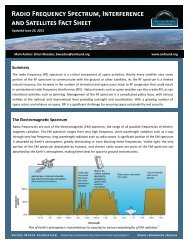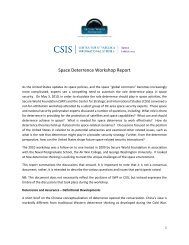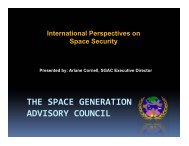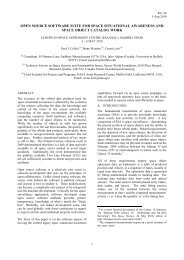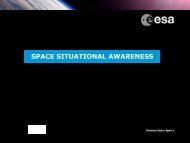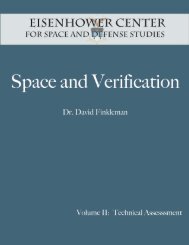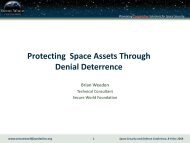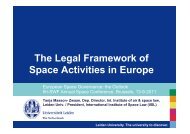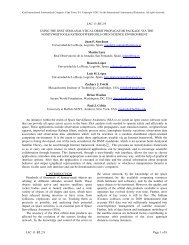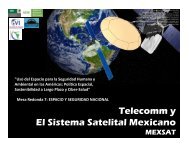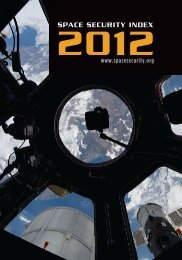Space Security Index
Space Security Index
Space Security Index
Create successful ePaper yourself
Turn your PDF publications into a flip-book with our unique Google optimized e-Paper software.
<strong>Space</strong> <strong>Security</strong> 2011<br />
96<br />
is scheduled for summer 2011 by the Russian company Cosmotras. 227 A domestically<br />
built Turkish EO satellite, initially scheduled for launch by Russia in December 2010, 228<br />
was postponed until April 2011. 229 On 21 November, Iranian defense minister Ahmad<br />
Vahimi claimed that the country was working on various satellites, some of which would<br />
be launched “in the near future.” 230 Possibly among them is the country's rst EO satellite,<br />
the Rasad (Observation), slated for launch in 2011. 231 Russia and South Africa signed a<br />
memorandum of understanding regarding cooperation in EO activities. 232 Within the<br />
framework of cooperation with African countries, Russia will launch South Africa’s ZA-002<br />
SumbandillaSat, 233 as well as two Nigerian EO satellites. 234<br />
e EO data systems also continued to evolve during 2010. In November, a conference<br />
of the Group on Earth Observations brought the Global Earth Observation System of<br />
Systems to the implementation phase. e European Commission and the Council adopted<br />
a joint declaration setting the goal of adopting GMES regulation and initial operations. 235<br />
During 2011, the Commission will consider ways to complete the overall GMES governance<br />
structure and present a new legislative proposal on this program beyond its initial operations.<br />
e Russia-driven EO monitoring and rescue system (MAKSM) received the support of<br />
Roscosmos; development and implementation are estimated to cost $10-billion. 236 In<br />
September, the rst Chinese EO micro-satellite was successfully launched, 237 and the<br />
Indian Cartosat 238 was launched in July. ESA’s CryoSat was also successfully launched from<br />
Baikonur in April 239 and will be used to monitor Earth’s ice elds. 240<br />
<strong>Space</strong> <strong>Security</strong> Impacts<br />
e development of and reliance on space systems for global utilities support their reliability<br />
and give countries a strong incentive to ensure safe and responsible space operations. Progress<br />
made on the compatibility and interoperability of space-based communications, Earth<br />
Observation, and navigation systems will likely have a positive impact on space security.<br />
However, increasing competition for radio frequencies represents a potential source of<br />
international friction and should be watched closely. Maintaining space for global utilities<br />
will likely require greater international cooperation to reduce the risks of orbital debris,<br />
protect the spectrum required by space systems, and promote safe and responsible space<br />
operations.



